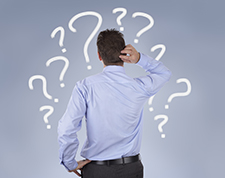 Before a job interview, it’s common to feel anxious about what you could be asked and wonder what kind of curve-ball questions might be thrown your way. However, as a Forbes article reveals, “it turns out, most companies will ask more common interview questions.” And that means during your prep time the night before your interview, you can prepare yourself for many of the questions that could be asked.
Before a job interview, it’s common to feel anxious about what you could be asked and wonder what kind of curve-ball questions might be thrown your way. However, as a Forbes article reveals, “it turns out, most companies will ask more common interview questions.” And that means during your prep time the night before your interview, you can prepare yourself for many of the questions that could be asked.
Realistically, it would probably take too much time and effort to practice answering all the common interview questions. But, when Forbes, U.S. News, and Monster published their most common interview questions lists, there were three questions that consistently appeared near the top of all three lists. So, if you want to make a good impression and take some of the stress out interviewing, make sure you’re at least ready to respond to these three questions.
Why are you leaving your current job?
Yes, it may be the all-time most dreaded question, but you better have your answer ready. Monster recommends that your response focuses on what you’re looking for in this new position. For instance, the article suggested, “After two years, I made the decision to look for a company that is team-focused, where I can add my experience.” U.S. News advocates that you can also cite new challenges that you’re seeking, a recent move, financial instability at your former employer, and other true reasons. They suggest avoiding badmouthing employers or complaining about work. The same applies if you’re unemployed and the interviewer is asking why you left your previous job. The number one thing to remember is to stay truthful and positive.
Why do you want to work here?
While this one might seem easy to answer, you want to answer it well. Simply saying you just need a job, paycheck, or health insurance isn’t going to impress the potential employer. “Your answer here should focus on what about the substance of the role most interests you,” U.S. News explains. “Interviewers want to hire people who have carefully considered whether this is a job they’d be glad to work at every day, and that means focusing on the work itself, not what the job can do for you.” So, as you prepare your answer to this question, think back to the key tasks and responsibilities listed in the job description and specifically pinpoint what piqued your interest.
Why should we hire you?
This question is your chance to sell your skills and experience to the employer and to convince them that you will benefit their organization. As U.S. News amply explains, “If you don’t know the answer to that, it’s unlikely that your interviewer will figure it out either.” Of all the questions, this is the one you must be ready to answer. By combining your “elevator speech” with the specific details you know about the employer and position, you should be able to present your abilities and experience as a solution to the company’s needs.
There are plenty of reasons to feel nervous about a job interview, but being anxious because you’re unprepared for the questions shouldn’t be one of them. And, Monster agrees – “Too many job seekers stumble through interviews as if the questions are coming out of left field. But many interview questions are to be expected.” So spend a little time thinking through potential questions and formulating your responses. Not only will you be more likely to impress the interviewer and move on to a second interview, you’ll also be less stressed and better able to spot the signs that the interview has gone well.
How do you prepare for common interview questions? Let us know in the comments section below!
Movin’ On Up is brought to you by Express Employment Professionals.



